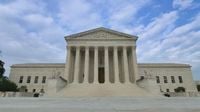The U.S. Supreme Court delivered a highly anticipated decision on August 14, 2025, allowing Mississippi’s contentious social media age-verification law to take effect—at least for now—while legal battles continue to unfold. The law, passed in 2024 and inspired by the tragic suicide of a Mississippi teenager following a sextortion scheme on Instagram, requires all social media users to verify their age before accessing platforms like Facebook, Instagram, X, and Nextdoor. For minors, parental consent is also mandatory before creating or using an account. The ruling has reignited a national debate over online safety, privacy, and free speech, with both supporters and critics voicing strong opinions.
The Supreme Court’s unsigned order rejected an emergency appeal from NetChoice, a tech industry group representing some of the world’s most influential technology companies, including Google (which owns YouTube), Snap Inc. (the parent of Snapchat), and Meta (the parent company of Facebook and Instagram). NetChoice has argued that the Mississippi law threatens privacy rights and unconstitutionally restricts free expression for users of all ages—not just minors. The group’s legal challenge is far from over, but for now, the law will be enforced as the case proceeds through the courts.
Justice Brett Kavanaugh, concurring with the majority, offered a glimpse into the Court’s thinking and the possible future of the case. He wrote that NetChoice might ultimately succeed in proving the law unconstitutional, citing Supreme Court precedents and lower court decisions that have struck down similar laws in other states. However, he explained that he agreed with the decision to let enforcement proceed because NetChoice had not demonstrated it would suffer immediate legal harm if the law went into effect during the ongoing lawsuit. As Kavanaugh put it, NetChoice had convinced him its challenge was “likely to succeed” on First Amendment grounds but failed to show the “balance of harms and equities favors it at this time.”
The origins of the law are deeply personal for many in Mississippi. House Bill 1126, which became law in 2024, was enacted after the death of a local teenager who took his own life following a sextortion plot on Instagram. The legislation is part of a broader push by states to limit minors’ access to social media, reflecting growing concerns among parents, educators, and even some teens about the impact of digital platforms on young people’s mental health. Supporters argue that stricter regulations are needed to combat what researchers describe as a surge in depression and anxiety linked to social media use among youth.
Mississippi Attorney General Lynn Fitch has been a vocal advocate for the law, highlighting its potential to protect young users from a host of online dangers. Fitch told the justices that age verification could help shield children from “sexual abuse, trafficking, physical violence, sextortion, and more”—activities she emphasized are not protected by the First Amendment. In her defense of the measure, Fitch also argued that the law has been enforced for over a year on other platforms without a single complaint about access, censorship, or companies struggling to comply.
The law’s requirements are sweeping. All users must verify their age before creating or using a social media account. For minors, parental permission is mandatory. The burden falls on tech companies to confirm users’ ages and ensure that minors are protected from harmful or inappropriate content. Companies that fail to comply could face civil fines of up to $10,000 per violation, along with potential criminal penalties. The stakes, both financially and reputationally, are high for the tech giants involved.
NetChoice, representing companies like YouTube and Meta, has countered that the law violates the First Amendment and threatens both privacy rights and the free exchange of ideas. The organization maintains that minors, like adults, are entitled to constitutional protections. In a statement to the court, NetChoice asserted, “As NetChoice has seen in other states, mandating age verification and parental consent for digital services violates privacy and stifles the free exchange of ideas.”
The legal drama began earlier in the summer of 2025, when U.S. District Judge Halil Suleyman Ozerden sided with NetChoice and temporarily blocked Mississippi from enforcing the law. Judge Ozerden acknowledged the state’s interest in protecting minors online but concluded that the measure likely violates the First Amendment. He noted that parents already have tools to monitor and limit their children’s online activity, casting doubt on the necessity of the new requirements.
However, the state quickly appealed to the 5th U.S. Circuit Court of Appeals, which, on July 17, 2025, temporarily put Judge Ozerden’s ruling on hold—allowing the law to be enforced while the case plays out. NetChoice responded by filing an emergency petition with the Supreme Court, arguing that Mississippi should not be permitted to reshape internet access before a judge fully explains why the law does not violate free speech protections, especially given that similar laws have been struck down elsewhere. The Supreme Court’s decision to let the law stand, for now, is a procedural setback for NetChoice but not the end of the road.
Paul Taske, co-director of the NetChoice Litigation Center, expressed disappointment with the Court’s decision but remained optimistic about the group’s prospects. “Although we’re disappointed with the Court’s decision, Justice Kavanaugh’s concurrence makes clear that NetChoice will ultimately succeed in defending the First Amendment—not just in this case but across all NetChoice’s ID-for-Speech lawsuits,” Taske said.
The Mississippi law is notably broader than other age-verification statutes, such as a Texas law upheld by the Supreme Court in June 2025, which applied only to online pornography. Mississippi’s measure, in contrast, requires all users to verify their ages for access to common social media sites, not just adult content. This expansive approach has drawn sharp criticism from digital rights groups and privacy advocates, who warn that mandatory age verification could create a "honeypot" of personal information and expose users to new risks.
Meanwhile, similar legal battles are playing out in Arkansas, Florida, Georgia, Ohio, and Utah, where NetChoice has filed lawsuits challenging comparable laws. The outcome of the Mississippi case could set a significant precedent for how states across the country regulate minors’ access to social media and balance online safety with constitutional rights.
For now, Mississippi residents—including children and their parents—will have to navigate the new age-verification requirements as the courts continue to weigh the law’s merits. With passions running high on both sides and the legal landscape shifting rapidly, the debate over how best to protect young people online while preserving fundamental freedoms is far from settled.
The Supreme Court’s decision marks just one chapter in an ongoing national conversation about technology, safety, and rights in the digital age—one that will undoubtedly shape the future of social media for years to come.






